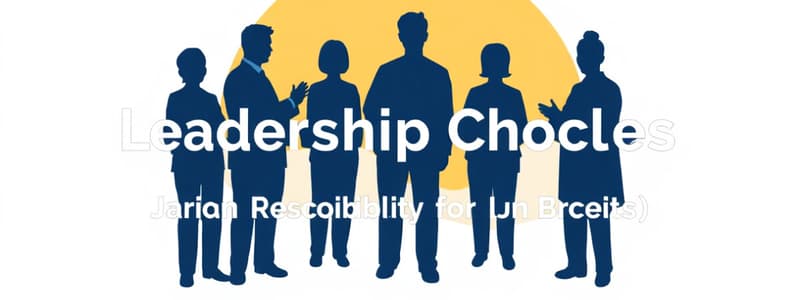Podcast
Questions and Answers
A family's influence on leadership selection is limited to teaching basic ethical principles, without significantly shaping a child's understanding of governance.
A family's influence on leadership selection is limited to teaching basic ethical principles, without significantly shaping a child's understanding of governance.
False (B)
The Constitution of the Republic of the Philippines recognizes the essential role of families in nation-building and governance.
The Constitution of the Republic of the Philippines recognizes the essential role of families in nation-building and governance.
True (A)
Children can develop the ability to critically evaluate leaders, partially by observing their parents and learning about social responsibilities.
Children can develop the ability to critically evaluate leaders, partially by observing their parents and learning about social responsibilities.
True (A)
The primary influence families exert on a children's leadership selection skills is through financial advice.
The primary influence families exert on a children's leadership selection skills is through financial advice.
Responsibility is merely a suggestion with no impact on how citizens should act.
Responsibility is merely a suggestion with no impact on how citizens should act.
Flashcards
Responsibility
Responsibility
A moral obligation to act correctly in different situations, ensuring leaders possess qualities needed to serve with integrity.
Parents' Role in Leadership
Parents' Role in Leadership
Parents are the initial guides, instilling ethical values that shape their children's perceptions of leadership and good governance.
Children's Role in Leadership
Children's Role in Leadership
Children learn to evaluate leaders by observing parents, participating in discussions, and understanding social responsibilities.
Role Models in Leadership
Role Models in Leadership
Signup and view all the flashcards
Instilling Values in Leadership
Instilling Values in Leadership
Signup and view all the flashcards
Study Notes
- Wisdom is essential when making decisions since every choice has consequences
- Choosing good leaders is one of the most significant decisions for a community and a nation
- Leadership shapes the values of society as well as policies and programs.
- This lesson examines how family guides others in identifying good leaders and establishes discernment and responsibility.
Understanding Responsibility
- Acting correctly in different situations is a moral obligation and is deemed responsibility
- Ensuring chosen leaders possess integrity and dedication to serve the country is our responsibility as citizens
- Families aid individuals developing wisdom to make informed decisions about leadership.
The Role of Parents in Guiding Leadership Choices
- Parents are a child's first instructor, offering instructions on making moral decisions and instilling values.
- Parents help shape their children's perceptions of leadership, discern honesty, compassion and dedication in leaders.
- Parents help their children understand good governance
The Role of Children in Leadership Discernment
- Children are expected to show support for good leadership while prioritizing their studies
- Children can develop the ability to critically evaluate leaders by listening to their parents, participating in discussions, and learning about social responsibilities.
- Simple decision-making prepares children for larger future responsibilities.
The Role of the Family in Nation-Building
- The Constitution of the Republic of the Philippines, Article XV, Section 1, recognizes the Filipino family as the foundation of the nation
- Section 4 states the State must protect the rights of families to participate in planning and implementing policies and programs that affect them
- Families play a crucial role in shaping the nation’s leadership and governance
How Families contribute to the nation’s well-being:
- Serving as Role Models for Good Leadership: Parents and elders set examples of responsibility, fairness, and integrity, which influence children’s perspectives on leadership.
- Encouraging Critical Thinking: Families guide children in carefully evaluating the qualities of leaders, helping children understand the importance of leaders that uphold justice and serve the common good
- Instilling the Right Values and Beliefs: The family teaches values such as honesty, integrity, compassion, and respect. These values shape children’s future decisions and their ability to assess leaders based on character rather than popularity.
Demonstrating Discernment in Leadership Choices
- Discernment is required to make wise decisions when choosing leaders
- Families can help individuals assess the character and intentions of those who desire leadership roles
- People can weigh the effects of their decisions and improve society through family discussions, role modeling, and value formation.
- Choosing leaders who possess wisdom and integrity is our responsibility to the nation.
- Families, as fundamental units, have the power to influence the direction of leadership and governance.
Studying That Suits You
Use AI to generate personalized quizzes and flashcards to suit your learning preferences.





